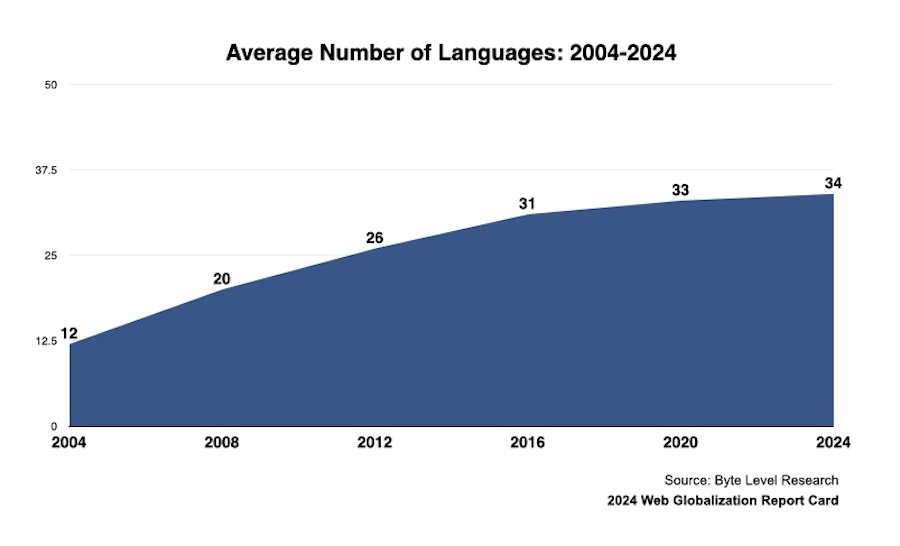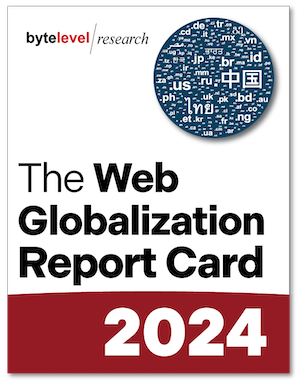Twenty years ago, Wikipedia was just a few years old and available in about a dozen languages.
Today, Wikipedia supports more than 300 languages and has emerged on top of the 2024 Web Globalization Report Card. Here are the top 25 websites overall:
- Wikipedia
- Airbnb
- Bosch
- Nestlé
- Coca-Cola
- Philips
- Adobe
- IKEA
- Volvo Cars
- DHL
- Spotify
- Canon
- Microsoft
- John Deere
- Apple
- Deloitte
- 3M
- The Church of Jesus Christ of Latter-day Saints
- Ford
- Netflix
- TripAdvisor
- Pfizer
- Uber
- Tesla
Wikipedia proves yet again that you don’t need to a be multinational corporation to successfully communicate with the world. You need only build a world-ready web template and recruit a passionate group of content creators and translators from around the world with a shared mission of creating and unlocking information for all.
Airbnb remains in second place in large part to its investment in customer-facing automatic translation (now better known as generative AI). I suspect we’re going to see a few other companies launch content models such as this within the travel sector, possibly this year. Stay tuned.
As you scan the list you’ll notice that tech companies don’t hold a monopoly in web globalization; you’ll see companies such as Bosch, IKEA, John Deere and Pfizer. When I began the Report Card 20 years ago, tech companies dominated this list; not any more.
A new entrant to the list is Tesla, and it could have scored even better had it not recently taken a step in reverse with its global gateway.
As a group, these 25 websites support an average of 58 languages.
This is quite a bit higher than the average for all 150 global websites studied, which is 34, seen here:

One does not make it into the top 25 based purely on languages. To be considered one of the best global websites, it must excel across four key areas:
- Global Reach (Languages): The internet connects computers, but it is language that connects people. To achieve a perfect score in this category, a website must support 50 or more languages, not counting US English.
- Global Navigation: If a web user cannot find his or her localized website, the site may as well not exist. That’s why global navigation (the “global gateway”) is so important.
- Global/Mobile Architecture: A website design should be globally consistent yet flexible enough to allow for local content and functionality. In addition, the design must adapt to mobile devices and usage scenarios. Global consistency provides users with a credible brand and experience as they navigate between the .com and local sites, and also allows for more efficient management. In addition to global consistency, the site must also be built so that users on mobile devices have a similar (or better) experience. The website should also be optimized for viewing on mobile devices, such as via responsive design. A mobile app is not required; however, if an app is available, it should provide language parity with the desktop website.
- Localization & Social: Content should be localized for the user’s culture, country, and community. A website may not translate all content for users across all sites (few companies go this far), but a website should translate enough content for users to have a positive experience. In other words, does the user find enough content in his or her language to fully understand a product or service, to complete a sale, or contact customer support? In addition, are visuals localized, including the use of local models? And social platforms should be supported in the user’s language and made prominent via the local websites. Finally, I do look for signs of websites using automatic translation to allow visitors to “unlock” content as needed instead of leaving the content untranslated (see Airbnb).
I’ll have more to share in the weeks ahead about the website leaders and key trends.
Click here to learn more about the 2024 Web Globalization Report Card.

